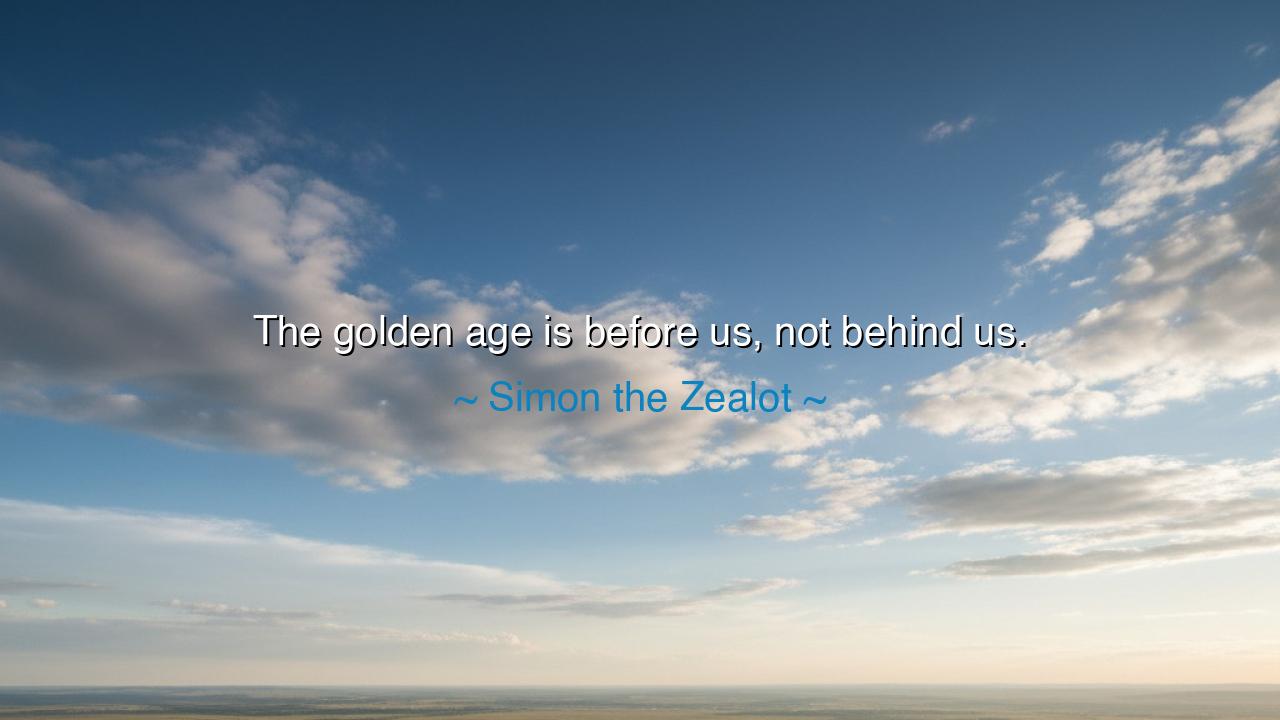
The golden age is before us, not behind us.






In the grand sweep of human history, there is a tendency to look back, to seek comfort and meaning in the past. We often look upon the golden ages of old—the time of great empires, brilliant minds, and heroic feats—and believe that those days were the pinnacle of human achievement. Yet, as the wise Simon the Zealot proclaimed, "The golden age is before us, not behind us." These words strike at the heart of human progress and hope, urging us to look not behind, but forward. The true potential of humanity, the greatness we aspire to, lies in the future, not in the bygone eras of greatness that have passed. The path to a new golden age is paved by the actions, the dreams, and the visions we dare to create in the present.
The ancients understood that history was not a static force. The Greeks, in particular, saw time as a flowing river, always moving forward, with the promise of new and better possibilities with each passing age. Heraclitus, a great philosopher, famously said that "you cannot step into the same river twice," meaning that time is always changing, never the same. Likewise, Simon the Zealot embraced the unfolding future, knowing that the golden age was not a relic of the past but a future vision to be realized. His words challenge us to seek greatness not by nostalgically yearning for what has already been, but by believing in the potential of what is yet to come.
Consider the rise of the Roman Empire, an era that for many represents the zenith of civilization in the ancient world. Yet, even in its time of greatness, there were those who looked beyond, who saw the future not as a decline, but as an opportunity for even greater achievements. Julius Caesar, in his drive to expand Rome’s power and influence, constantly sought new horizons, never resting on the laurels of the past. While the empire’s greatest days would eventually fade, it was in the vision of future expansion that its strength was found. Caesar’s relentless forward-looking ambition mirrors Simon’s belief that true greatness is always ahead of us, a future yet to be written.
The Renaissance, centuries later, offers another compelling example of how humanity can rise again, creating a golden age out of the ashes of the past. The Renaissance came after the fall of the great Roman Empire, after a period of decline and darkness. But during this period, great minds such as Leonardo da Vinci, Michelangelo, and Galileo dared to imagine a new era, a rebirth of art, science, and culture. They did not look back to the supposed golden ages of the Greeks or Romans; they created something fresh, vibrant, and revolutionary. They saw not a lost golden age, but a future golden age—an age they themselves would help to create.
Simon’s words ring especially true today, in an age where technological and social advancements are rapidly transforming our world. We are at the threshold of a new golden age, an age shaped by innovations in medicine, science, and technology. The internet, artificial intelligence, and space exploration are not just the stuff of dreams; they are the engines of progress that propel us toward a future of limitless potential. Yet, just as the Romans, Renaissance artists, and modern visionaries did before us, we must embrace the future with a sense of hope, action, and creativity, refusing to be trapped by the past. True greatness lies not in the memories of what was, but in the possibilities of what is yet to come.
The lesson that Simon the Zealot imparts to us is one of vision and belief in the power of the future. History is not merely the tale of what has already passed; it is a living story, constantly evolving, constantly being written. Each of us has a role in shaping the future, in creating the next golden age. It is not in retreating into the past that we find purpose, but in the action we take today to build a better tomorrow. Dream of the future, work toward it with diligence and passion, and remember that our greatest achievements are still ahead of us, waiting to be realized.
Therefore, let us live with a sense of purpose and vision, knowing that the golden age is not behind us, but is something we can help bring to life. We must embrace the opportunities of the present, challenge the limitations of the past, and shape a future that surpasses all that has come before. Just as the ancients knew that time flows ever forward, so too must we, recognizing that the world’s greatest possibilities lie in the ages yet to come. With each action, each vision, each step toward the future, we inch closer to creating the golden age Simon spoke of—a future glorious in its potential, and ours to shape.






AAdministratorAdministrator
Welcome, honored guests. Please leave a comment, we will respond soon